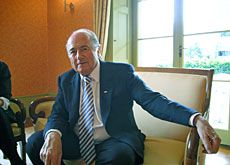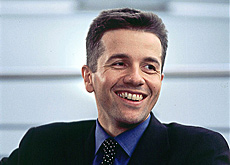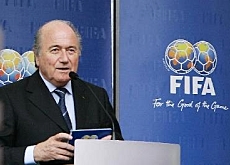Blatter prepares for third term as Fifa head

Fifa president Sepp Blatter will be standing for re-election – unopposed - when the world's football associations hold their 57th congress in Zurich on Thursday.
Blatter, who has held the post at soccer’s governing body since 1998, is seeking a third mandate. swissinfo caught up with him just before the election.
The 2010 World Cup in South Africa is the flagship event of the next presidency, which will extend until 2011.
swissinfo: In what state of mind are you going into Fifa’s 57th congress and your re-election as president?
Joseph Blatter: I take the confidence that has been given to me as thanks for the work I have been doing at Fifa for the past 32 years.
I think that I can be proud of my career. Mind you, I’m a little surprised to be the sole candidate because I like competition, but I am not going to complain all the same.
swissinfo: You believe that the president of Fifa should step down after two mandates. To justify your third term, you say that you were “not allowed to work in peace”. How did you handle the criticisms, which were sometimes pretty vicious against you personally?
J.B.: I have gone through very difficult moments. But just as on the [football] pitch I acted like the number nine, in other words a man who goes forward without worrying too much about what’s happening behind him.
Of course it hurt but I was always certain that Fifa and footballers were behind me. People tried to damage me and put the brakes on; it’s like that when you defend a cause.
A man always has to believe in what he is doing and believe his actions are justified, to make progress. With the help of God, I always believed that football was more than just tapping a ball around. I felt it could be a positive force in society. There are an enormous number of footballers around the globe and it is therefore possible to have an influence on them with the sport.
swissinfo: Is that in the spirit of your third mandate which you have put under the label “social responsibility”?
J.B.: Yes, because we have this social responsibility in what is the most popular game in the world. It affects the behaviour of players, the clubs, league competitions and youth education through sport at school.
But it’s also investment that we must have in society, culture, the economy, media and politics. Despite the corruption that affects football and against which we are fighting [racism, doping, bets etc] this sport exudes passion, emotion, entertainment and in particular… hope.
In a world that is so lacking in stability, football can contribute to a better understanding among peoples.
swissinfo: A major event will mark your third term in office, the World Cup in South Africa. How important is this for you?
J.B.: We’ve seen the exodus of African players for years without ever trying to give something back to the continent.
When I was elected head of Fifa in 1998, one of my first concerns was to change the statutes to introduce regulations that included a rotation of the continents organising the World Cup. Without those changes, it would not have been possible to stage the World Cup in Africa. Today, Africans are ready and capable of organising “their” World Cup.
swissinfo: Will the arrival of your former adviser and friend Michel Platini at the head of Uefa [Union of European Football Associations] allow you to make new reforms for the World Cup, notably as far as refereeing is concerned?
Michel Platini, who was with me in 1998, spoke the same language as I do. For us, football is a game before being a business. We are both aware that it’s necessary to put the accent on refereeing and control of the game because these days the stakes in a game of football are enormous.
We have a few ideas like, for example, having four linesmen, not to improve offside decisions but to really help the referee in certain decisions. Tests are going to be carried out and if they prove conclusive, changes can be made relatively rapidly.
swissinfo: Next year Switzerland and Austria are staging the European Championship. You criticise a lack of enthusiasm [in Switzerland]. Why?
J.B.: There is a lack of enthusiasm! When a parliament asks how much an event like Euro 2008 will cost to stage, instead of asking what it can bring the country, that says a lot.
There should be much more commitment for this event in Switzerland because it will help spread the word about Switzerland abroad. Everyone wants to see European football dominate the world of soccer.
swissinfo: Will you be in the stadiums?
J.B.: Of course, both in Switzerland and Austria.
swissinfo-interview: Mathias Froidevaux
Joseph S. Blatter was born on March 10, 1936 in the town of Visp. After gaining a degree as Bachelor of Business Administration and Economics at Lausanne University, he joined Fifa in 1975.
After rising to the position of General Secretary, Blatter succeeded João Havelange of Brazil as Fifa’s eighth president on June 8, 1998. His first election was at a Fifa congress in Paris.
Fifa member associations voted for him again on May 29, 2002 in Seoul. A Fifa congress in Doha in 2003 exceptionally prolonged his term of office by one year so that the next election would not coincide with the World Cup in Germany in 2006.
Blatter is due to be elected for a third term on May 31 in Zurich. It will last till 2011.
He retains the confidence of the football family despite attacks against him, notably by his former general secretary, Michel Zen-Ruffinen, and British journalist Andrew Jennings, who have accused him of corruption and nepotism.
Fifa (The International Federation of Association Football) is soccer’s governing body and is based in Zurich.
Founded in Paris in 1904 Fifa is the umbrella of the confederations of the six continents.
It organises a number of different football competitions, among them the World Cup for men and women.

In compliance with the JTI standards
More: SWI swissinfo.ch certified by the Journalism Trust Initiative


You can find an overview of ongoing debates with our journalists here . Please join us!
If you want to start a conversation about a topic raised in this article or want to report factual errors, email us at english@swissinfo.ch.